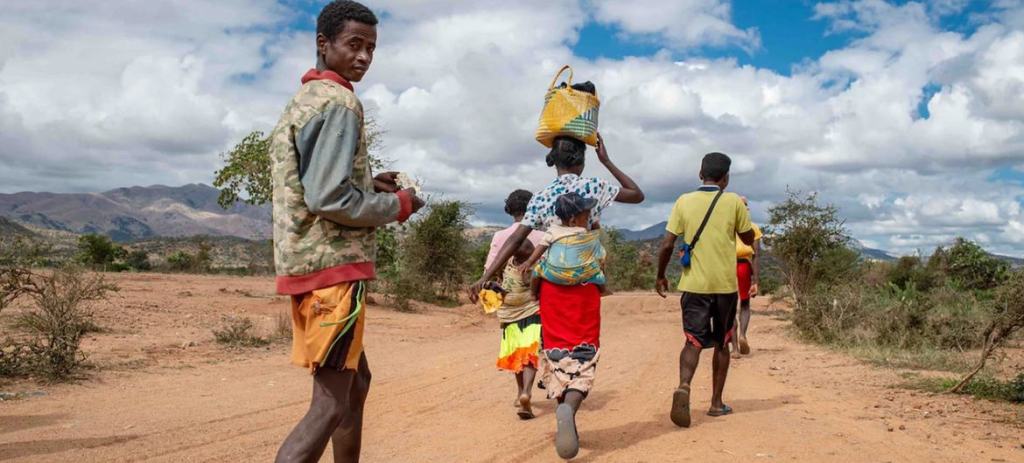
By Anders Lorenzen
For climate scientists, the war in Ukraine came at the worst possible time as the media attention they would have hoped for surrounding the release of the latest Intergovernmental Panel on Climate Change (IPCC) report was urgently diverted to the breaking news story of Russia invading Ukraine.
But nevertheless, the UN did release yet another stark climate report (The Working Group II report is the second instalment of the IPCC’s Sixth Assessment Report (AR6), which will be completed this year) warning that current ambition is far from enough to starve off the worst impacts of the climate crisis.
In the IPCC report, scientists outlined how climate change is already causing dangerous and widespread disruption to our ecosystems, and impacting billions of people around the world, those least able to cope being hit the hardest.
The authors state that the world faces unavoidable multiple climate hazards over the next two decades, with anticipated warming of 1.5°C. Going beyond 1.5 degrees will be irreversible and see high risks to infrastructure and low-lying coastal settlements.
At the COP26 held in Glasgow last year, the chair of the conference Alok Sharma said that the chance of limiting warming to within 1.5°C is razer thin and on ‘life-support’.
Hoesung Lee, Chair of the IPCC said about the report findings: “This report is a dire warning about the consequences of inaction. It shows that climate change is a grave and mounting threat to our well-being and a healthy planet. Our actions today will shape how people adapt and nature responds to increasing climate risks.”
UN: urgent action needed now more than ever
The scientists who worked on the report say that increased heat waves, droughts and floods are already exceeding tolerance thresholds and driving mass mortalities in trees and corals. These weather extremes cause cascading impacts that have exposed millions of people to acute food and water insecurity, especially in Africa, Asia, Central and South America, the small island states and the Arctic. Accelerated action through deep cuts in greenhouse gas (GHG) emissions is needed to avoid the mounting loss of life, biodiversity and infrastructure.
A path for adaptation
The report outline the options for adapting to a changing climate and provides new insights into nature’s potential? to not only reduce risks but also improve people’s lives.
IPCC Working Group II Co-Chair Hans-Otto Pörtner said: “Healthy ecosystems are more resilient to climate change and provide life-critical services such as food and clean water. By restoring degraded ecosystems and effectively and equitably conserving 30 to 50 per cent of Earth’s land, freshwater and ocean habitats, society can benefit from nature’s capacity to absorb and store carbon, and we can accelerate progress towards sustainable development, but adequate finance and political support are essential.”
Climate risks
The authors also outline a detailed assessment of climate impacts, risks and adaptation in cities, where more than half the world’s population live. People’s health, lives and livelihoods, as well as property and critical infrastructure, are being increasingly adversely affected by hazards from heatwaves, storms, drought and flooding as well as slow-onset changes such as sea-level rise.
The authors say this key finding underlines the urgency for climate action, focusing on equity and justice. Adequate funding, technology transfer, political commitment and partnership would lead to more effective climate change adaptation and emissions reductions.
Pörtner concluded: “The scientific evidence is unequivocal: climate change is a threat to human wellbeing and the health of the planet. Any further delay in concerted global action will miss a brief and rapidly closing window to secure a liveable future.”
It is the first time that a UN climate report has significantly outlined how many people will be displaced due to the accelerating pace of the climate crisis. Reacting to the report Senior Advocate and Climate Displacement Program Manager at Refugees International, Kayly Ober commented: “The latest report from the IPCC paints a grim picture: the magnitude of existing and coming climate change impacts is much larger than previously acknowledged and is already contributing to displacement and humanitarian crises around the world. For organizations working on the ground with displaced communities, this assessment is not unobvious. However, it is the first time that scientists have agreed with a high degree of confidence on climate change’s role in displacement.”
Categories: climate change, science, UN
5 replies »